#like the author of the article
Text
genuinely it will never stop baffling me how people will wear twilight shirts and talk about team Edward vs team Jacob and then the same people will be like "I'm not basing my personality off of a piece of media (harry potter) made by a transphobe 😌" like good that's great! so you can excuse racism but you draw the line at transphobia? good to know
#remember when twilight came out and there were news articles about the quileute tribe and also if you read the books with your eyes#you know that theyre extremely like INSANELY racist#i remember reading them at age 10 and thinking 'wow this author hates women and native americans'#and i was right bc later i found out shes mormon 😐#begging you all to take racism and especially pretty extreme racism against natives seriously lmfao
21K notes
·
View notes
Text
The discussions of Elizabeth Gaskell always seem to focus on who she's not. She's not Dickens, she's not Austen, she's not Elliot, and she's definitely not one of the Brontes. At best, they'll say she has Dickens' social justice concerns and Austen's country houses, but who is she? What makes her perspective unique?
As I consider this, I keep coming back to, "She's kind."
She is so kind.
There is a compassion in her writing unlike anything I've seen from other authors. She wants to see people. Know them. Understand them. And when she does, she loves them, faults and all.
When she laughs at people, it's not the satire of Austen or the caricature of Dickens--it's a fond, loving laugh that likes these people in all their ridiculousness.
Even when she's pushing a very clear message about how people should or shouldn't act, you never get the sense that she's judging people who fail to live up to that standard--she's just trying to understand how they got to the place where they made the wrong decision.
In her world, people are kind and deserve to be treated kindly. But that doesn't mean that she ignores the darkness in life. She sees the darkness and sin and squalor and says that's why we need to be kinder to each other. Her kindness comes not from ignoring reality but by paying so much attention to reality that she comes to care deeply for everyone. And I just go crazy over it.
#books#elizabeth gaskell#brought to you by one article that was like 'gaskell's so underrated'#and proceeded to explain why she's inferior to all other classic authors#and by reading one more chapter of ruth#where everyone was so kind that i just wanted to go feral#granted that she has a huge body of work with widely varying tones so this prob doesn't apply to everything#but it's what sticks out to me as uniquely gaskell
345 notes
·
View notes
Text
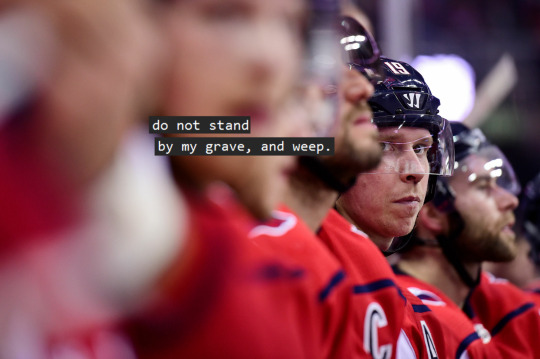
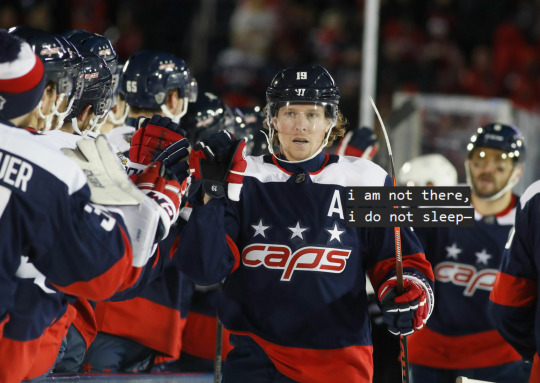
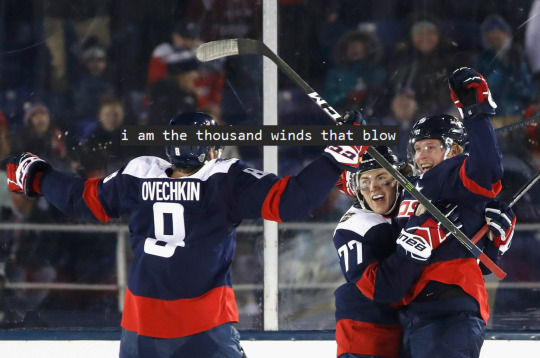

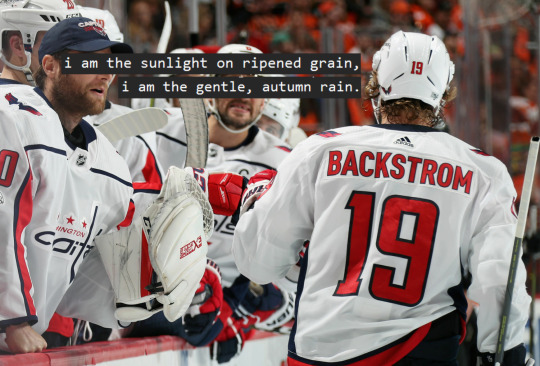
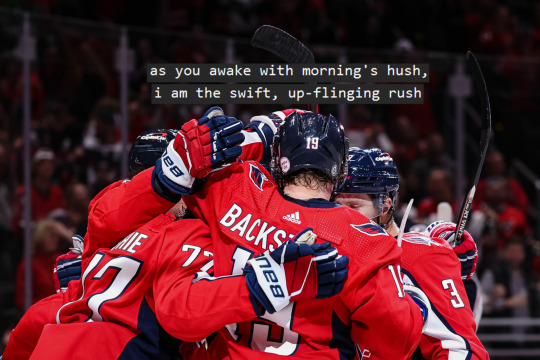
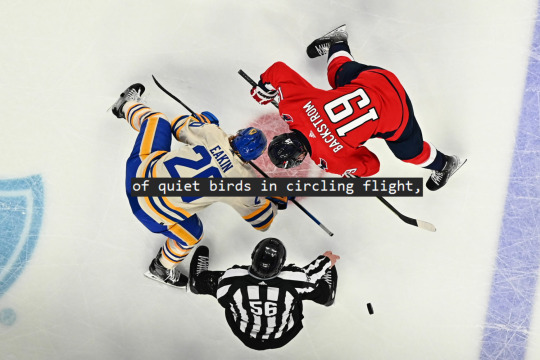
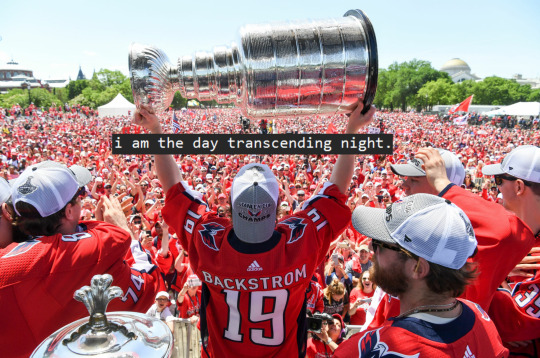
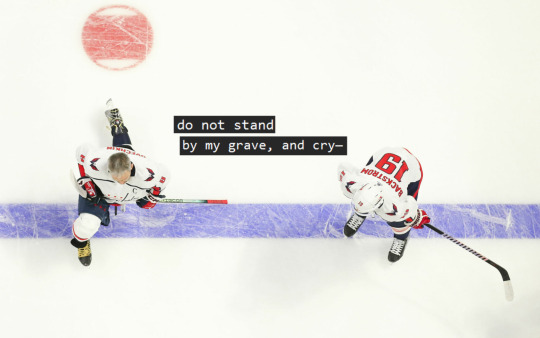
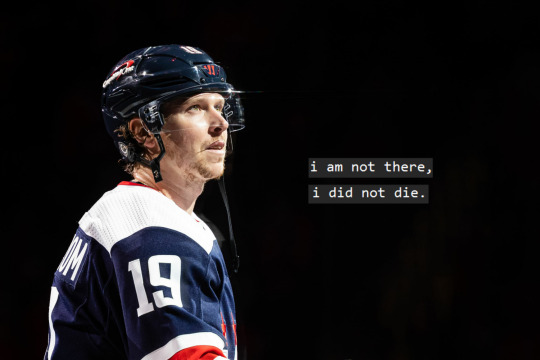
Nicklas Bäckström & the Washington Capitals (+ nickeovi) ― Immortality, Clare Harner | insp.
credits: x. x. x. x. x. x. x. x. x. x.
#uh. it has not been done yet right?#because the whole thing was kickstarted by another nicke post with a caption that read something like#“he really did say do NOT weep on my grave you're so annoying”#but i cant find it anymore#edit: found it! tysm @lafragolina <3#& by association i did not find other edits w nicke and this poem in particular#so i hope i did not rip anyone off -- in case let me know i'll delete#apropos of this poem i don't know how common knowledge it is (i did not know for once but i also do not read poetry that often so)#it is often attribuited to the wrong author one mary elizabeth frye who used to hand out copies of this poem w her name attached to it#she even changed some lines! anyway i linked the wiki article if you wanna check out more info -- its interesting#nicklas backstrom#nicklas bäckström#alexander ovechkin#washington capitals#nickeovi#819#hockey rpf#hockey stuff#hockey poetry
192 notes
·
View notes
Text
i’m so sorry but if you’re in the ‘fantasy media is escapism I don’t want to think about any REAL world problems‘ crowd then why are you posting about the witcher. there are few fantasy sagas that are quite so explicit and intentional as the Witcher when mirroring its characters, world, and conflict around real people, politics, and everyday struggles. also that’s why it’s GOOD
#this is not about netlix I don’t watch the show n I don’t care abt it#don’t worry im not really vaguing anyone on here it’s just stuff I read online and in articles and social media in general#tires me out and also makes me sad for the long and important legacy of fantasy authors and creators doing their best to#translate and break down their reality into a fantastical setting :(#like don’t do sapkowski like this he worked hard to make this real#the witcher#the witcher books#double shot
882 notes
·
View notes
Text
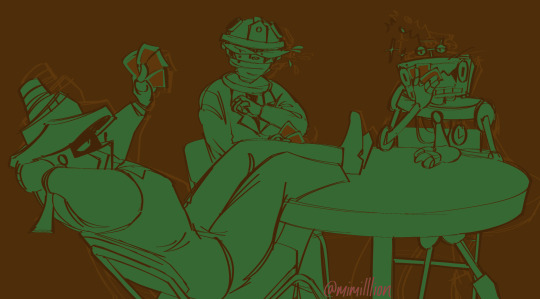
dogs (cogs) playin poker (toono)
#fanart#toontown corporate clash#toontown#ttcc#ttcc fanart#toontown directors#director of land development#dold#derrick hand#director of public affairs#dopa#buck wilde#desmond kerosene#dana s. charme#had to bust out the classic rock dad playlist to draw this#one of dana's likes is playing cards so i imagine her and buck are playing CRAZY mind games with each other during this#meanwhile desmond is just completely out of the loop. what a fool#anyways i love these three dudes a lot im glad they're getting a bit more attention bcuz of the article#grinning widely holding back tears emoji#overwhelming authority
177 notes
·
View notes
Text
reading this article about how climate change denialism is a way to express a hypermasculine anxiety to protect the continued western usage of fossil fuels, a “petro-masculinity” tied to the violent act of burning oil and gas as an expression of USAmerican sovereignty
#authoritarian personality name drop also hell yeah#actually this psychology section is probably gonna be cringe. this author does not define authoritarian which is very annoying#limited postcolonial analysis also. still pretty interesting#i think you can extend this to like death drive desires if you wanted to be very psychological about it#like the car is contingent upon a fuel that will cook us all to death. and westerners dont want to give that up. much to consider!#still reading so hopefully im not just repeating whats in the article#book club
94 notes
·
View notes
Text
Closely connected to the act of name signing was the act of writing poems on walls. As scholars have already pointed out, with beginnings traceable to the Six Dynasties, wall poems (tibishi) were already very widespread during the Tang. By Christopher Nugent's count, well over one thousand entries in the Complete Tang Poems had titles indicating that they began as inscriptions on some surface other than paper or scrolls. These surfaces included walls at places of gathering and transit, such as post stations, scenic sites, inns, and increasingly in the latter part of the Tang, Buddhist temples, which also served public roles for lay gatherings and performances. (100)
In one anecdote, a latecomer casts aspersions on a first writer's literary skills, comparing him to the general Xiang Yu (232-202 BCE), who was infamous for having learned just enough writing to manage his name: "Li Tang signed his name on a pavilion in Zhaoying County. When Wei Zhan [jinshi degree 865] saw it, he took a brush and dashed off a taunt: 'The rivers of Wei and Qin brighten the eyes, / but why is Xiren short on poetic spirit? / Perhaps he mastered only what Beauty Yu's husband could / learning to write just enough to put down his name.' " ... It would not be a stretch to imagine the sniggering of those who read this inscription in a frequented pavilion. (102)
For a degree seeker in Chang'an, these circuits of information and judgment received more discussion than the actual examination itself. Tang literati wrote copiously about activities such as name signing, public exposure, and triumph. It would not be an exaggeration to say that in ninth-century temples and popular recreation areas, the vertical spaces were teeming with verses that clamored for attention. (104)
selections on poetic graffiti from linda rui feng's city of marvel and transformation: chang'an and narratives of experience in tang dynasty china (university of hawaii press, 2015)
#china#tang dynasty#tagamemnon#<- couldn't stop thinking about graffiti from pompeii while reading this chapter so i suspect it may be of interest to rome-heads in genera#this was very promising book that felt like it failed to fully deliver - can't tell if the author was trying not to get into aspects which-#-have a paucity of surviving sources or if perhaps she was trying to avoid stepping on the toes of existing scholarship#e.g. nugent's mentioned book on poetry production/circulation or juduth zeitlin's article on wall poems and anxieties of loss#but even though i felt like it needed another 50-100 pages of fleshing out there are some generally remarkable moments in here#bits that can be put in remarkable parallel with imperial rome certainly; more fascinatingly with 19th- and early 20th-century fiction-#-that deals closely with 'new' modern urban life. where the forms & patterns of the city itself collude with residents against the newcomer#some interesting notes on bai juyi in here too. though i don't know if they're news to any real bai juyi stans out there
36 notes
·
View notes
Text
I finally (!!) finished translating the articles Mut found in ep.2, as promised
Disclaimer: not a native Thai speaker, still learning 🙏

Introducing "Tongrak", the famous young author all the girls are crazy about
After releasing just a few works, it's been a constant stream of hits for the writer with the pen name "TR". These works have made readers want to get to know the real person and to dig into the identity of the owner of this pen name until finding out that the famous author's name is "Tongrak". The young man is a passionate new writer, good-looking, and has all the girls and others raving about him and falling head over heels for him after photos of him leaked on social media and got reposted over a hundred-thousand times just overnight.
For anyone who wants to get to know young "Tongrak" better
[click to read more]

"Tongrak" elated after his works 'go international' in several countries throughout Asia
His continuous release of works has made the name of young writer "Tongrak", or pen name "TR", become widely known. No matter how many works he's released, the response by readers exceeds expectations and makes every novel he writes worth keeping an eye on - even abroad and, more so, his novels are able to 'go international'! The rights were bought to have them translated and printed in several languages while also having producers and distributors for a TV series in various countries throughout Asia. He remains happy to have his novels adapted as dramas in the future which is another level of success for this handsome young author, indeed.
[click to read more]

Prepare to swoon!!! Revealing an exciting new BL series, a work by the good-looking writer "Tongrak" (TR)
For handsome, talented young author "Tongrak", the time is just right for a new release! He has already published countless hit novels so on trend among readers that multiple producers have bought the rights to turn them into series for fujoshis to fangirl over to their heart's content. This time the novel by "Tongrak" being adapted for TV again is "The Boy Next World The Series". The show is about love and a relationship that lots of people may actually have experienced in real life.
[click to read more]

"Tongrak", the author with the golden touch, out with new book among the Top 5 bestselling novels
For young "Tongrak", the passionate author, it's been a constant string of releases. With writing that has a distinct character, beautiful evocative prose, and transports readers into the fictional world of his novels, he most recently released a new novel for fans to read: "Love Director", which is already such a hit to be the bestseller in the Top 5! Young "Tongrak" is overjoyed and encouraged to keep writing great works.
[click to read more]
#love sea the series#love sea ep 2#tongrak#peat wasuthorn#local woman harps on about linguistics#i love how every single article is like-#oh this young man right here? a bestselling author. so handsome his photos went viral. a huge hit with the entire y industry. what a catch!#local woman harps on about love sea
46 notes
·
View notes
Text
In my autistic opinion, people who think that media literacy is a cure all to misunderstandings forget that a story is a two way conversation and the onus is on the storyteller to communicate in a way their reader will hear. If someone has to read your mind to understand your story, that’s poor writing.
#this post is brought to you by the author of the I hate my husband article claiming we’re all idiots for thinking she hates her husband#just because she wrote about her blatantly dysfunctional marriage and all the things that she hates about him#and how the only way she can tolerate him is to ignore everything he says#oh and also we’re misogynists for saying that’s a bad marriage and everyone’s marriages are secretly like this#and also jk rowling saying that she has never ever called for harm against trans people ever#'i never said we should boil them i just said we should put them in a pot of water that happens to be on a fire'
72 notes
·
View notes
Text


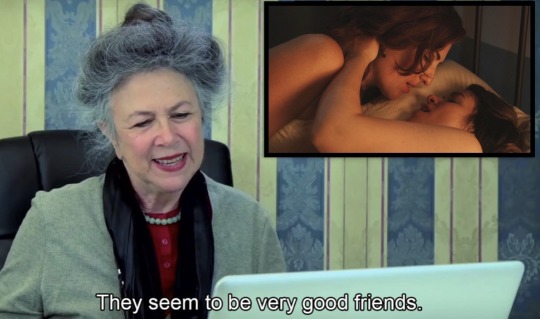
#people are enjoying this over on twitter so I’m sharing it here too#but like… did the author of the article even watch the show?#there are so many other ACTUAL sapphic friendships they could have featured#Jess and Lupe? Carson and Max? Greta and Jo? hello???#a league of their own#aloto
411 notes
·
View notes
Text
this article is like deeply bad. it´s just a bunch of whining about several things the author doesnt like, which i guess are all connected in this one type of person because the author says it. in an attempt to be pro worker it paints workers as being so reactionary they are instantlyrepelled by anyone who is not some guy in a suit. about the only worthwhile advice is the bit about having more interests than just communism which is true but also its kinda common sense, you cant go through life with only one interest
31 notes
·
View notes
Text

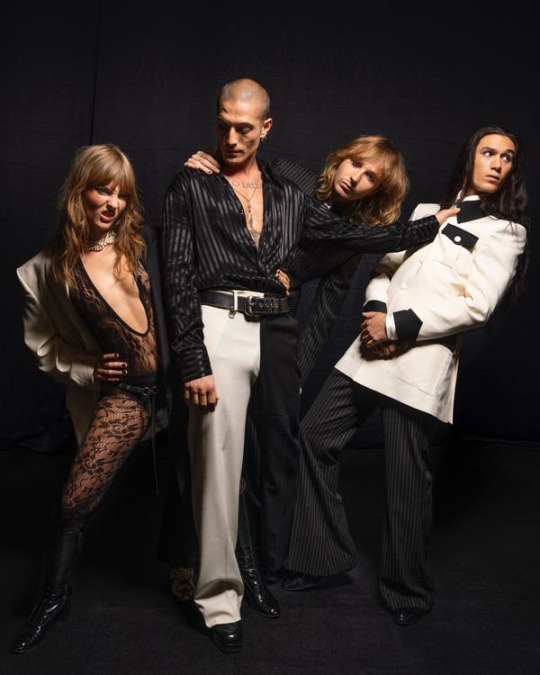
The sheer number of older and more experienced professionals involved in Måneskin introduces a tension between the rock conventions that characterize their songwriting and the fundamentally pop circumstances under which those songs are produced. They are four friends in a band, but that band is inside an enormous machine. From their perspective, though, the machine is good.
The American visitor to Rome arrives with certain preconceptions that feel like stereotypes but turn out to be basically accurate. There really are mopeds flying around everywhere, and traffic seems governed by the principle that anyone can be replaced. Breakfast is coffee and cigarettes. Despite these orthopedic and nutritional hazards, everyone is better looking — not literally everyone, of course, but statistically, as if whatever selective forces that emerge from urban density have had an extra hundred generations or so to work. And they really do talk like that, an emphatic mix of vowels, gestures and car horns known as “Italian.” To be scolded in this language by a driver who wants to park in the crosswalk is to realize that some popular ideas are actually true. Also, it is hot.
The triumphant return to Rome of Måneskin — arguably the only rock stars of their generation, and almost certainly the biggest Italian rock band of all time — coincided with a heat wave across Southern Europe. On that Tuesday in July the temperature hit 107 degrees. The Tiber looked thick, rippled in places and still in others, as if it were reducing. By Thursday morning the band’s vast management team was officially concerned that the night’s sold-out performance at the Stadio Olimpico would be delayed. When Måneskin finally took the stage around 9:30 p.m., it was still well into the 90s — which was too bad, because there would be pyro.
There was no opening act, possibly because no rock band operating at this level is within 10 years of Måneskin’s age. The guitarist Thomas Raggi played the riff to “Don’t Wanna Sleep,” the lights came up and 60,000 Italians screamed. Damiano David — the band’s singer and, at age 24, its oldest member — charged out in black flared trousers and a mesh top that bisected his torso diagonally, his heavy brow and hypersymmetrical features making him look like some futuristic nomad who hunted the fishnet mammoth. Victoria De Angelis, the bassist, wore a minidress made from strips of leather or possibly bungee cords. Raggi wore nonporous pants and a black button-down he quickly discarded, while Ethan Torchio drummed in a vest with no shirt underneath, his hair flying. For the next several minutes of alternately disciplined and frenzied noise, they sounded as if Motley Crüe had been cryogenically frozen, then revived in 2010 with Rob Thomas on vocals.
That hypothetical will appeal to some while repelling others, and which category you fall into is, with all due respect, not my business here. Rolling Stone, for its part, said that Måneskin “only manage to confirm how hard rock & roll has to work these days to be noticed,” and a viral Pitchfork review called their most recent album “absolutely terrible at every conceivable level.” But this kind of thumbs up/thumbs down criticism is pretty much vestigial now that music is free. If you want to know whether you like Måneskin — the name is Danish and pronounced MOAN-eh-skin — you can fire up the internet and add to the more than nine billion streams Sony Music claims the band has accumulated across Spotify, YouTube, et cetera. As for whether Måneskin is good, de gustibus non est disputandum, as previous Italians once said: In matters of taste, there can be no arguments.
You should know, though, that even though their music has been heard most often through phone and laptop speakers, Måneskin sounds better on a soccer field. That is what tens of thousands of fans came to the Stadio Olimpico on an eyelid-scorching Thursday to experience: the culturally-if-not-personally-familiar commodity of a stadium rock show, delivered by the unprecedented phenomenon of a stadium-level Italian rock band. The pyro — 20-foot jets of swivel-articulated flame that you could feel all the way up in the mezzanine — kicked in on “Gasoline,” a song Måneskin wrote to protest Vladimir Putin’s invasion of Ukraine. From a thrust platform in the center of the field, David poured his full emotive powers into the pre-chorus: “Standing alone on that hill/using your fuel to kill/we won’t take it standing still/watch us dance.”
The effect these words will have on President Putin is unknown. They capture something, though, about rock ’n’ roll, which has established certain conventions over the last seven decades. One of those conventions is an atmosphere of rebellion. It doesn’t have to be real — you probably don’t even want it to be — but neither can it seem too contrived, because the defining constraint of rock as a genre is that you have to feel it. The successful rock song creates in listeners the sensation of defying consensus, even if they are right in step with it.
The need to feel the rock may explain the documented problem of fans’ taste becoming frozen in whatever era was happening when they were between the ages of 15 and 25. Anyone who adolesced after Spotify, however, did not grow up with rock as an organically developing form and is likely to have experienced the whole catalog simultaneously, listening to Led Zeppelin at the same time they listened to Pixies and Franz Ferdinand — i.e. as a genre rather than as particular artists, the way my generation (I’m 46) experienced jazz. The members of Måneskin belong to this post-Spotify cohort. As the youngest and most prominent custodians of the rock tradition, their job is to sell new, guitar-driven songs of 100 to 150 beats per minute to a larger and larger audience, many of whom are young people who primarily think of such music as a historical artifact. Starting this month, Måneskin will take this business on a multivenue tour of the United States — a market where they are considerably less known — whose first stop is Madison Square Garden.
“I think the genre thing is like ... ” Torchio said to me backstage in Rome, making a gesture that conveyed translingual complexity. “We can do a metaphor: If you eat fish, meat and peanuts every day, like for years, and then you discover potatoes one day, you’ll be like: ‘Wow, potatoes! I like potatoes; potatoes are great.’ But potatoes have been there the whole time.” Rock was the potato in this metaphor, and he seemed to be saying that even though many people were just now discovering that they liked it, it had actually been around for a long time. It was a revealing analogy: The implication was that rock, like the potato, is here to stay; but what if rock is, like the potato in our age of abundance, comparatively bland and no longer anyone’s favorite?
Which rock song came first is a topic of disagreement, but one strong candidate is “Rocket 88,” recorded by Ike Turner and his Kings of Rhythym band in 1951. It’s about a car and, in its final verse, about drinking in the car. These themes capture the context in which rock ’n’ roll emerged: a period when household incomes, availability of consumer goods and the share of Americans experiencing adolescence all increased simultaneously.
Although and possibly because rock started as Black music, it found a gigantic audience of white teenagers during the so-called British Invasion of the mid-1960s (the Beatles, the Rolling Stones, the Who), which made it the dominant form of pop music for the next two decades. The stadium/progressive era (Journey, Fleetwood Mac, Foreigner) that now constitutes the bulk of classic-rock radio gave way, eventually, to punk (the Ramones, Patti Smith, Minor Threat) and then glam metal: Twisted Sister, Guns N’ Roses and various other hair-intensive bands that were obliterated by the success of Nirvana and Pearl Jam in 1991. This shift can be understood as the ultimate triumph of punk, both in its return to emotive content expressed through simpler arrangements and in its professed hostility toward the music industry itself. After 1991, suspicion of anything resembling pop became a mark of seriousness among both rock critics and fans.
It is probably not a coincidence that this period is also when rock’s cultural hegemony began to wane. As the ’90s progressed, larger and again whiter audiences embraced hip-hop, and the last song classified as “rock” to reach No. 1 on the Billboard Hot 100 was Nickelback’s “How You Remind Me” in 2001. The run of bands that became popular during the ’00s — the Strokes, the Killers, Kings of Leon — constituted rock’s last great commercial gasp, but none of their singles charted higher than No. 4. Let us say, then, that the era of rock as pop music lasted from 1951 to 2011. That’s a three-generation run, if you take seriously rock’s advice to get drunk and have sex in the car and therefore produce children at around age 20. Baby boomers were the generation that made rock a zillion-dollar industry; Gen X saved it from that industry with punk and indie, and millennials closed it all out playing Guitar Hero.
The members of Måneskin are between the ages of 22 and 24, situating them firmly within the cadre of people who understand rock in the past tense. De Angelis, the bassist, and Raggi, the guitarist, formed the band when they were both attending a music-oriented middle school; David was a friend of friends, while Torchio was the only person who responded to their Facebook ad seeking a drummer. There are few entry-level rock venues in Rome, so they started by busking on the streets. In 2017, they entered the cattle-call audition for the Italian version of “The X Factor.” They eventually finished as runners-up to the balladeer Lorenzo Licitra, and an EP of songs they performed on the show was released by Sony Music and went triple platinum.
In 2021, Måneskin won the Sanremo Music Festival, earning the right to represent Italy with their song “Zitti e Buoni” (whose title roughly translates to “shut up and behave”) in that year’s Eurovision Song Contest. This program is not widely viewed in the United States, but it is a gigantic deal in Europe, and Måneskin won. Not long after, they began to appear on international singles charts, and “I Wanna Be Your Slave” broke the British Top 10. A European tour followed, as well as U.S. appearances at festivals and historic venues.
This ascent to stardom was not unmarred by controversy. The Eurovison live broadcast caught David bending over a table offstage, and members of the media accused him of snorting cocaine. David insisted he was innocent and took a drug test, which he passed, but Måneskin and their management still seem indignant about the whole affair. It’s exactly this kind of incongruous detail — this damaging rumor that a rock star did cocaine — that highlights how the Italian music-consuming public differs from the American one. Many elements of Måneskin’s presentation, like the cross-dressing and the occasional male-on-male kiss, are genuinely upsetting to older Italians, even as they seem familiar or even hackneyed to audiences in the United States.
“They see a band of young, good-looking guys that are dressing up too much, and then it’s not pure rock ’n’ roll, because you’re not in a garage, looking ugly,” De Angelis says. “The more conservative side, they’re shocked because of how we dress or move onstage, or the boys wear makeup.”
She and her bandmates are caught between two demographics: the relatively conservative European audience that made them famous and the more tolerant if not downright desensitized American audience that they must impress to keep the ride moving. And they do have to keep it moving, because — like many rock stars before them — most of the band dropped out of high school to do this. At one point, Raggi told me that he had sat in on some classes at a university, “Just to try to understand, ‘What is that?’”
One question that emerged early in my discussions with Måneskin’s friendly and professional management team was whether I was going to say that their music was bad. This concern seemed related to the aforementioned viral Pitchfork review, in which the editor Jeremy Larson wrote that their new album, “RUSH!” sounds “like it’s made for introducing the all-new Ford F-150” and “seems to be optimized for getting busy in a Buffalo Wild Wings bathroom” en route to a score of 2.0 (out of 10). While the members of Måneskin seemed to take this review philosophically, their press liaisons were concerned that I was coming to Italy to have a similar type of fun.
Here I should disclose that Larson edited an essay I wrote for Pitchfork about the Talking Heads album “Remain in Light” (score: 10.0) and that I think of myself as his friend. Possibly because of these biases, I read his review as reflecting his deeply held and, among rock fans, widely shared need to feel the music, something that the many pop/commercial elements of “RUSH!” (e.g. familiar song structures, lyrics that seem to have emerged from a collaboration between Google Translate and Nikki Sixx, compulsive use of multiband compression) left him unable to do.
This perspective reflects the post-’90s rock consensus (PNRC) that anything that sounds too much like a mass-market product is no good. The PNRC is premised on the idea that rock is not just a structure of song but also a structure of relationship between the band and society. From rock’s earliest days as Black music, the real or perceived opposition between rocker and society has been central to its appeal; this adversarial relationship animated the youth and counterculture eras of the ’60s and then, when the economic dominance of mass-market rock made it impossible to believe in, provoked the revitalizing backlash of punk. Even major labels felt obliged to play into this paradoxical worldview, e.g. that period after Nirvana when the most popular genre of music was called “alternative.” Måneskin, however, are defined by their isolation from the PNRC. They play rock music, but operate according to the logic of pop.
In Milan, where Måneskin would finish their Italian minitour, I had lunch with the band, as well as two of their managers, Marica Casalinuovo and Fabrizio Ferraguzzo. Casalinuovo had been an executive producer working on “The X Factor,” and Ferraguzzo was its musical director; around the time that Måneskin broke through, Casalinuovo and Ferraguzzo left the show and began working with the stars it had made. We were at the in-house restaurant of Moysa, the combination recording studio, soundstage, rehearsal space, offices, party venue and “creative playground” that Ferraguzzo opened two months earlier. After clarifying that he was in no way criticizing major record labels and the many vendors they engaged to record, promote and distribute albums, he laid out his vision for Moysa, a place where all those functions were performed by a single corporate entity — basically describing the concept of vertical integration.
Ferraguzzo oversaw the recording of “RUSH!” along with a group of producers that included Max Martin, the Swedish hitmaker best known for his work with Backstreet Boys and Britney Spears. At Moysa, Ferraguzzo played for me Måneskin’s then-unreleased new single, “Honey (Are U Coming?)” which features many of the band’s signature moves — guitar and bass playing the same melodic phrases at the same time, unswung boogie-type rhythm of the post-Strokes style — but also has David singing in a higher register than usual. I listened to it first on studio monitors and then through the speaker of Ferraguzzo’s phone, and it sounded clean and well produced both times, as if a team of industry veterans with unlimited access to espresso had come together to perfect it.
The sheer number of older and more experienced professionals involved in Måneskin introduces a tension between the rock conventions that characterize their songwriting and the fundamentally pop circumstances under which those songs are produced. They are four friends in a band, but that band is inside an enormous machine. From their perspective, though, the machine is good.
“There’s hundreds of people working and talking about you and giving opinions,” De Angelis said at lunch. “So if you start to get in this loop of wanting to know and control and being anxious about it, it really ruins everything.” Here lies the conflict between what the PNRC wants from a band — resistance to outside influences, contempt for commerce, authenticity as measured in doing everything themselves — and what any sane 23-year-old would want, which is to have someone with an M.B.A. make all the decisions so she can concentrate on playing bass.
The other way Måneskin is isolated from the PNRC is geographic. Over the course of lunch, it became clear that they had encyclopedic knowledge of certain eras in American rock history but were only dimly aware of others. Raggi, for instance, loves Motley Crüe and has an album-by-album command of the Los Angeles hair-metal band Skid Row, which he and his bandmates seemed to understand were supposed to be guilty pleasures. But none of them had ever heard of Fugazi, the post-hardcore band whose hatred of major labels, refusal to sell merchandise and commitment to keeping ticket prices as low as possible set the standard for a generation of American rock snobs. In general, Måneskin’s timeline of influences seems to break off around 1990, when the rock most respected by Anglophone critics was produced by independent labels that did not have strong overseas distribution. It picks up again with Franz Ferdinand and the “emo” era of mainstream pop rock. This retrospect leaves them unaware of the indie/punk/D.I.Y. period that was probably most important in forming the PNRC.
The question is whether that consensus still matters. While snobs like Larson and me are overrepresented in journalism, we never constituted a majority of rock fans. That’s the whole point of being a snob. And snobbery is obsolete anyway; digital distribution ended the correlation between how obscure your favorite band was and how much effort you put into listening to them. The longevity of rock ’n’ roll as a genre, meanwhile, has solidified a core audience that is now between the ages of 40 and 80, rendering the fan-versus-society dimension of the PNRC impossible to believe. And the economics of the industry — in which streaming has reduced the profit margin on recorded music, and the closure of small venues has made stadiums and big auditoriums the only reliable way to make money on tour — have decimated the indie model. All these forces have converged to make rock, for the first time in its history, merely a way of writing songs instead of a way of life.
Yet rock as a cluster of signifiers retains its power around the world. In the same way everyone knows what a castle is and what it signifies, even though actual castles are no longer a meaningful force in our lives, rock remains a shared language of cultural expression even though it is no longer determining our friendships, turning children against their parents, yelling truth at power, et cetera. Also like a castle, a lot of people will pay good money to see a preserved historical example of rock or even a convincing replica of it, especially in Europe.
In Milan, the temperature had dropped 20 degrees, and Måneskin’s show at Stadio Giuseppe Meazza — commonly known as San Siro, the largest stadium in Italy, sold out that night at 60,000 — was threatened by thunderstorms instead of record-breaking heat. Fans remained undaunted: Many camped in the parking lot the night before in order to be among the first to enter the stadium. One of them was Tamara, an American who reported her age as 60½ and said she had skipped a reservation to see da Vinci’s “Last Supper” in order to stay in line. “When you get to knocking on the door, you kind of want to do what you want,” she said.
The threat of rain was made good at pretty much the exact moment the show began. The sea of black T-shirts on the pitch became a field of multicolored ponchos, and raindrops were bouncing visibly off the surface of the stage. David lost his footing near the end of “I Wanna Be Your Slave,” briefly rolling to his back, while De Angelis — who is very good at making lips-parted-in-ecstasy-type rock faces — played with her eyes turned upward to the flashing sky, like a martyr.
The rain stopped in time for “Kool Kids,” a punk-inspired song in which David affects a Cockney accent to sing about the vexed cultural position of rock ’n’ roll: “Cool kids, they do not like rock/they only listen to trap and pop.” These are probably the Måneskin lyrics most quoted by music journalists, although they should probably be taken with a grain of salt, considering that the song also contains lyrics like “I like doin’ things I love, yeah” and “Cool kids, they do not vomit.”
“Kool Kids” was the last song before the encore, and each night a few dozen good-looking 20-somethings were released onto the stage to dance and then, as the band walked off, to make we’re-not-worthy bows around Raggi’s abandoned guitar. The whole thing looked at least semichoreographed, but management assured me that the Kool Kids were not professional dancers — just enthusiastic fans who had been asked if they wanted to be part of the show. I kept trying to meet the person in charge of wrangling these Kool Kids, and there kept being new reasons that was not possible.
The regular kids, on the other hand, were available and friendly throughout. In Rome, Dorca and Sara, two young members of a Måneskin fan club, saw my notebook and shot right over to tell me they loved the band because, as Sara put it, “they allow you to be yourself.” When asked whether they felt their culture was conservative in ways that prevented them from being themselves, Dorca — who was 21 and wearing eyeglasses that looked like part of her daily wardrobe and a mesh top that didn’t — said: “Maybe it turns out that you can be yourself. But you don’t know that at first. You feel like you can’t.”
Here lies the element of rock that functions independently from the economics of the industry or the shifting preferences of critics, the part that is maybe independent from time itself: the continually renewed experience of adolescence, of hearing and therefore feeling it all for the first time. But how disorienting must those feelings be when they have been fully monetized, fully sanctioned — when the response to your demand to rock ’n’ roll all night and party every day is, “Great, exactly, thank you.” In a culture where defying consensus is the dominant value, anything is possible except rebellion. It must be strange, in this post-everything century, to finally become yourself and discover that no one has any problem with that.
#måneskin#maneskin#i had a free nyt article so here you go#the article is so painfully a middle aged american perspective#which the author admits#and like thinking the fans on stage is staged?!??#or like how there can be no more authentic rebellion - maybe that's what it's like from your cushy position#but doesn't go into tdi at all#the stuff about the industry surrounding them i agree and its worth the read though
82 notes
·
View notes
Text
its just that i think henry winter wouldn't be your friend. henry winter wouldn't look at you if you were on the train together. henry winter wouldn't use tumblr or the internet and he is also racist
#journal#the secret history#dark academia#i <3 henry winter like everyone else. i love this book!#but its annoying how people ignore the actual writing for the aesthetic of beige oxford sweaters autumn tea#on an unrelated note i recommend reading the secret oral history of bennington by lili anolik.#its a great article ab authors like tartt and bret easton ellis and what student life was like in bennington around that time
12 notes
·
View notes
Text

She prayed and there was no answer. No one was there—or if there was, He/lt was cowering from her.
God had turned His face away, and why not? This horror was as much His doing as hers.
#reading#books read in 2024#bookblr#books#book photography#book blog#bibliophile#books reading#books and reading#carrie#carrie white#carrie 1976#stephen king#king#horror#telekinesis#telekinetic#prom night#blood#pig blood#revenge#review#four stars#august reads#liked the articles inserted throughout#king has become a fav author for sure
12 notes
·
View notes
Text
Hello, I am going to discuss my thoughts on content/trigger warnings as someone living with OCD. I am absolutely open to good faith engagement and discussion on this topic.
Having some thoughts on the idea that adding trigger warnings somehow ultimately harms the person with the trigger. They absolutely can create an easy tool to obsessively control your access to the topics/to avoid them, but I’ve always felt it should be the potentially triggered person’s decision on what they were ready to do about it. Uncontrolled exposure is just as capable of causing obsession as is avoidance, in my opinion.
I think of the (terrible telephone retelling of a) case I heard about while discovering recounts of actual lived experiences with OCD.
—The following example discusses intrusive thoughts about domestic violence.—
A woman had an obsession with being was afraid of hitting her boyfriend. Her compulsion was that she would have to hold her arms stiffly by her side. She recognized this as OCD and sought exposure response prevention. Her therapist told her to try and ignore the compulsion, or potentially do the opposite. The woman became so obsessed with healing she forced herself to keep her hands away from her sides (almost obsessively) and constantly checked whether or not she “still wanted to hit him.” In the end, the ERP just became entangled with her obsessions.
It takes so much strength to face these types of problems and practice the mindfulness and grace with yourself to recognize it. It’s something you really need to be ready for because it’s going to take a lot of effort to do the hard thing when the easy thing is right there.
How can we claim it’s best to “force” exposure on someone else? How can we go around vigilante therapising people we have deemed too ill to do it on their own (or just be left alone)?
This is not to say that anyone is bad if they can’t or don’t want to tag things. More just my thoughts about how pushback against that idea can swing too hard into trying to prove not tagging was morality correct.
Some articles that articulate so much of my experience with OCD:
Having No Cure for OCD Is the Cure
Help! I Have OCD About What’s OCD
In the spirit of bodily autonomy, I think we all deserve agency in our lives no matter how “incompetent” other people may think we are. When you’re ready, you’re ready. There’s no healing to be had sitting around thinking you’re broken or lazy or whatever for not being ready to change. We all owe each other the kindness to do what we can in good faith, too.
I started doing too much table setting in the tags, so I’ll put it under a read more, lol.
I recognize that this isn’t very radically (in the abolition vs reform sense) anti-psychiatry, and I do have a complicated relationship with that idea. I recognize that I have a good deal of privilege (particularly among people with more stigmatized/less understood “disorders”) but this framework is the only one I’ve ever been able to access that gives me any insight into myself at all. That isn’t something everyone can afford to do in several senses.
As a physically disabled person, I just connect my experiences with chronic illness and mental illness (which I think can fall under the umbrella of chronic on its own) more and more these days. What truly was the difference between not being able to do something out of pain versus anxiety? Our brains are organs, too. Our thoughts are chemical and hormonal, too.
One of the fondest memories I have of coming to terms with disability was explaining my experience with an autoimmune condition to a bipolar friend, and he replied that we were “chronic illness buddies.” And I felt so understood as someone who has suffered with various types of anxieties for their entire waking life.
#actually ocd#antipsychiatry#i guess maybe this falls in that category? idk#mental health#intrusive thoughts#ocd#as an OCD haver I lean a lot on stuff like the CBT methods used in ERP#just in the first article I link the author (therapist with OCD) talks about getting dumped by the book (DSM)#and it just hits home rlly hard#I have more a take what you want and leave the rest approach to it#ocd tag
40 notes
·
View notes
Text
There’s a screenshot going around that says:
Buck wasn't too happy about Eddie becoming fast friends with Tommy and was outwardly jealous. Tommy and Buck's sister Maddie (Jennifer Love Hewitt) both assumed that Buck was jealous because he had unresolved feelings for Eddie, but this thread has not been revisited since.
I am not trying to be a buzzkill but that’s from a Screen Rant article (derogatory) that is based off the Entertainment Weekly article and not any new info and was only written to get buddie fans’ clicks because it has the clickbaity title: 9-1-1 Season 8 Showrunner Reveals Change In Buck & Eddie's Relationship
It also has this very telling bit:
The popular pairing of Eddie and Buck has been advocated for by many in the 9-1-1 viewership ever since Eddie's introduction in season 2, only intensifying as the two friends grew closer in subsequent seasons and Buck became something of a second father to Chris. There's a chance to revisit that possibility, with Eddie feeling neglected and isolated. But if the hit drama is finally going to start to address a frequent audience request, it likely won't spoil the surprise ahead of time.
So, you know. Don’t get excited when you read articles like this because they aren’t based on anything except the author’s own speculation on the article we all read, not new information from Tim Minear.
#tldr that screenshot doesn’t mean it’s going to be revisited it’s just the article author’s spec#anyway it’s not even that I’m that worried about debunking this in particular#I just see people take stuff in articles like that too seriously
10 notes
·
View notes